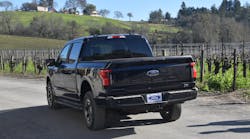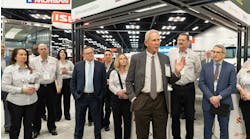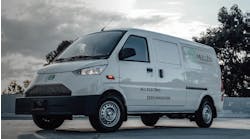SONOMA, California—The revered art of winemaking, in many ways, hasn't changed over the centuries. But the wine industry's close bond with the land—and to the sunlight and air and water—means that winemakers are keenly aware of any change in the climate. They can taste it.
So one of the most forward-thinking wine-growing counties in the U.S. is looking to advance its sustainability mission, and the Ford Pro suite of electric vehicles and charging and telematics services has been tapped to help make that happen.
Ford Pro and the Sonoma County Winegrowers, a group of more than 1,800 grape farmers in Northern California, are launching a pilot program that will add Ford F-150 Lightning Pro pickups, E-Transit cargo vans, and Ford Pro Intelligence products and services to three pilot farms in Sonoma County, one of the world’s most renowned wine regions.
See also: Ford Pro Charging launches guide to fleet EV transition
The heart of the mission is to demonstrate how electric vehicles and web-based fleet management tools can have a positive impact on the agriculture industry in terms of increasing productivity, improving sustainability, and lowering the total cost of fleet ownership anywhere between 10% and 20%.
“Ford Pro is thrilled to team with the Sonoma County Winegrowers to further their sustainability goals and begin their transition to fully integrated all-electric fleets with on-site charging,” said Wanda Young, Ford Pro global chief marketing officer. “Ford Pro and the Sonoma County Winegrowers are driven by many of the same tenets—to accelerate productivity while operating responsibly.”
The pilot program is launching with Bevill Vineyard Management and Vino Farms in Healdsburg and Dutton Ranch in Sebastopol, which collectively represent about 4,000 acres in the vineyard-rich Russian River Valley. Young anticipates the program will expand in the coming months to include other farming operations in Sonoma.
About 60,000 acres across the county are dedicated to growing wine grapes, and another 120,000 acres are used for other diversified agriculture, such as apple orchards, dairy farms, and cut flowers. In 2014, the Sonoma County Winegrowers launched an initiative to represent one of the nation’s leading winegrowing regions in terms of sustainability, with a target of reaching sustainable designation for nearly all of the county's vineyard acreage.
Karissa Kruse, Sonoma County Winegrowers president and internationally renowned sustainability champion, said she believes electric vehicle adoption and efficient fleet management are the next steps in sustainability.
In addition to the vehicles, farms can consult with the Ford Pro team for the duration of the program. Pilot farmers will have access to Ford Pro Intelligence software, home and depot charging, Ford Pro Telematics Essentials and Ford Pro E-Telematics, and energy management—all to help reduce operating costs and more efficiently manage gas- and electric-powered vehicle fleets.
“This collaboration with the Ford Pro team is a great natural next step to help us continue our progress in sustainable agriculture,” Kruse said. “A lot of farming families have a rich history with Ford, and with history comes trust. So as many of our farmers look for ways to lead in innovation and be a part of the solution, that trust is critical when it comes to investing in electric vehicles and in solutions to manage farming fleets. Our farmers love this pilot program; it’s going to be foundational.”
At the venerated Inglenook winery in Rutherford, a new 22,000-sq.-ft. wine cave will accommodate 120 stainless steel fermenting tanks, each one designated for a respective vineyard block—thus allowing the winemaking team to maintain the integrity of the individual block's character. The winery, part of filmmaker Francis Ford Coppola's winemaking business, is a leader in innovation, and Ford's new EVs will be able to travel inside the cave where internal combustion engines are prohibited.
Jonathan Tyer, Inglenook associate winemaker, showed off the new wine cave, emphasizing that staying up to date with technology does not detract from his art.
“We've always looked toward newer technologies, things that will help us in any way for our winemaking. Technology gives you more data points to watch, especially during fermentation," he said. "You can constantly check on things—but rather than manually go and check on things multiple times a day, if I have [sensors] set for a certain temperature range, it can send me a text [or] call me if a temperature starts going out of whack. I can be able to react much faster and save something before there's an issue.”
Ford Pro services should blend nicely at Inglenook.
Farmers’ tools
A year in the life of a Sonoma County winegrower can be sliced into two portions: roughly nine months to grow and three months to harvest. Occasionally, as in 2017, the uncertainties of Mother Nature condense the harvest into a four-week sprint. There's no time for vehicle downtime in that situation.
Ford Pro Intelligence gives farmers access to important data on every vehicle—whether gas-powered or electric. The web-based service offers always-on access to vehicle health reports and other data designed to help limit vehicle downtime while lowering operating costs. All across Sonoma, on farms large and small, winegrowers rely daily on their trucks to haul everything from fertilizer and fuel tanks to water and portable bathrooms. Some vehicles log upward of 50,000 miles a year, traveling between properties from Cloverdale to Petaluma.
Naturally, operating these vehicles—and maintaining them to keep them operational—is one of an organization’s largest expenses. At Dutton Ranch, which runs a fleet of about 70 work vehicles, fuel costs average about $5,000 per month. The prospect of reducing that monthly expense is critical to operations moving forward. Electric vehicles, coupled with the solar power that many Sonoma County ranches already generate and store, represent an important way to help offset rising fuel costs.
The technology connects wirelessly, helping businesses manage fleets with real-time vehicle insights. Information includes maintenance schedules, charge event monitoring, vehicle tracking, state of charge, range, charge history and logs, charging/battery settings and alerts, and departure preconditioning to help maximize range and save battery life for the road to get the job done.
“Just as an F-150 Lightning or E-Transit is an essential asset for a small business owner, so too is Ford Pro Intelligence,” Young said. “We believe that the telematics data will change the way farmers manage their fleets and operations.”
As veterans in sustainability practices, the Sonoma County Winegrowers have impacted other vocations regionally. Representatives in trucking, logistics, grocery stores, and other specialties have taken notice, and Kruse hopes her organization continues to help lead the charge.
Ford, meanwhile, is among the automotive leaders in sustainability—working with California for stronger vehicle greenhouse gas standards. Ford is targeting 100% renewable energy for its global operations by 2035 and being fully carbon neutral worldwide by 2050.






